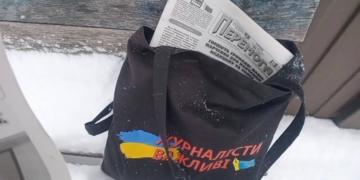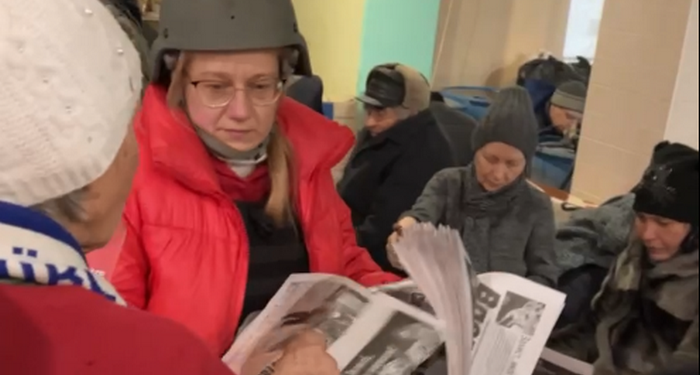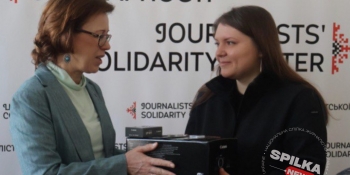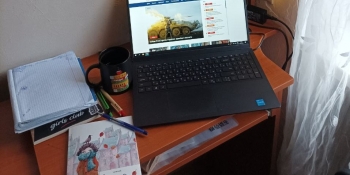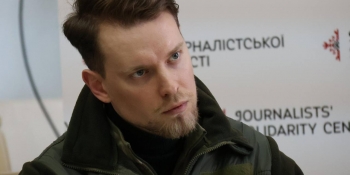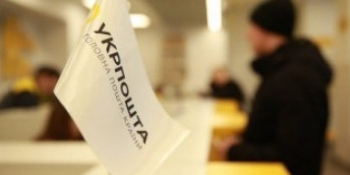Are social media networks and the Internet assistants or dangerous competitors? Is it possible to effectively cooperate with Ukrposhta? What does it take to get support from grant-givers? A lively discussion on these and other topics took place on Monday, January 30, during an online meeting entitled Resilience of Local Media: Reviving Operation in De-Occupied Territories held by the National Union of Journalists of Ukraine (NUJU) in the format of a media coffee.
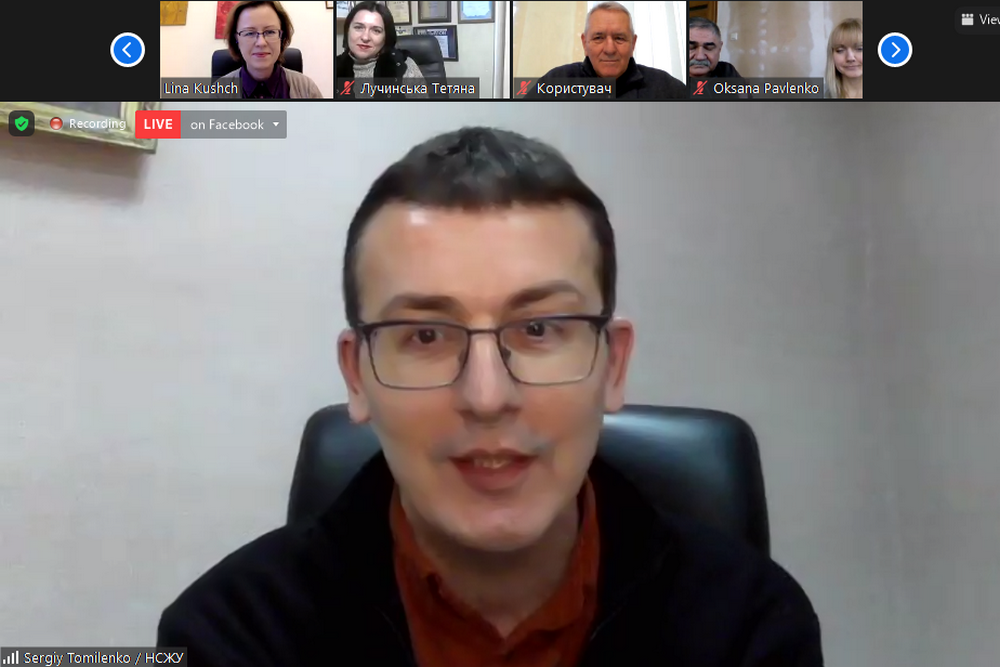
According to NUJU President Sergiy Tomilenko, the market of traditional media, especially local media, was at a fever pitch even before the war, but now they are literally trying to survive. Therefore, among the priorities of the NUJU now is to support Regional and local media, especially in the frontline and de-occupied territories.
“As long as postal services are not ready to work at full capacity, and people are not ready to allocate sufficient funds for subscription, the support of Ukrainian media is taken over by foreign financial donors,” notes the NUJU President.
Sergiy Tomilenko emphasized that the Union had attracted funds from foreign benefactors to print at least one issue of 20 Regional and local Ukrainian print media in the de-occupied and front-line territories.
“We have to unite, support each other, attract help for this from wherever possible. Every journalist in Ukraine should feel the friendly shoulder of colleagues!” emphasized the President of the NUJU and called on Ukrainian media representatives to more actively use the Union’s services, in particular, its Journalists’ Solidarity Centers, which one can find out about on the website and social networks of the NUJU.
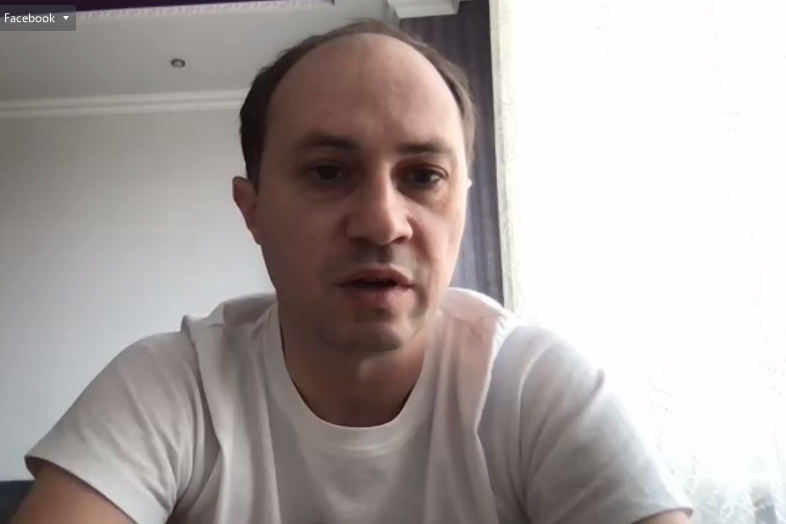
Director of programs of the International Institute for Regional Media and Information (IRMI) / manager of the project called Increasing Resilience of Ukrainian Media, Oleksii Soldatenko, spoke about this project, in which, by the way, some of the participants of the meeting are already participating, while others have a chance to join in the next cycles if the project is extended. Oleksii Soldatenko thanked the NUJU for meaningful and effective work and expert assistance in the selection of candidates for international financial and training aid.
The discussion between the participants of the event revolved primarily around how economically feasible and effective it is to supplement the development of print media with their sites, accounts, and channels on social networks.
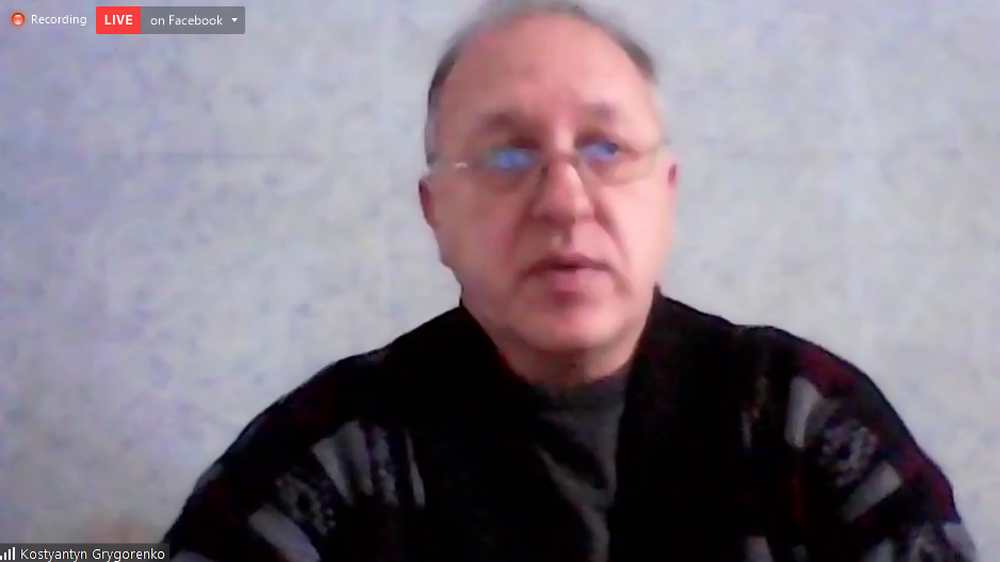
“Due to the occupation of Izium, I was relocated for nine months,” Kostiantyn Hryhorenko, the editor-in-chief of the Obrii Iziumshchyny newspaper, said. “It is clear that all this time it was not possible to publish a printed newspaper. But we maintained our site despite two cyberattacks. We collected information, checked it, and delivered it to readers.
Kostiantyn Hryhorenko emphasized that digital platforms can bring real income to editorial offices. For example, the Obrii Iziumshchyny website had been showing positive profitability dynamics for 2-3 years before the war. During the war, in September 2022, the editorial office resumed cooperation with advertising exchanges and earns on this.
“Large global corporations and supermarkets are returning to the Ukrainian market, including in the de-occupied territories, and are looking for consumers and cooperation with the media,” emphasized Kostiantyn Hryhorenko.
The editor is convinced that both the Internet and print media currently have good prospects for development. So, readers responded very positively to the re-release of the printed version of Obrii Iziumshchyny.
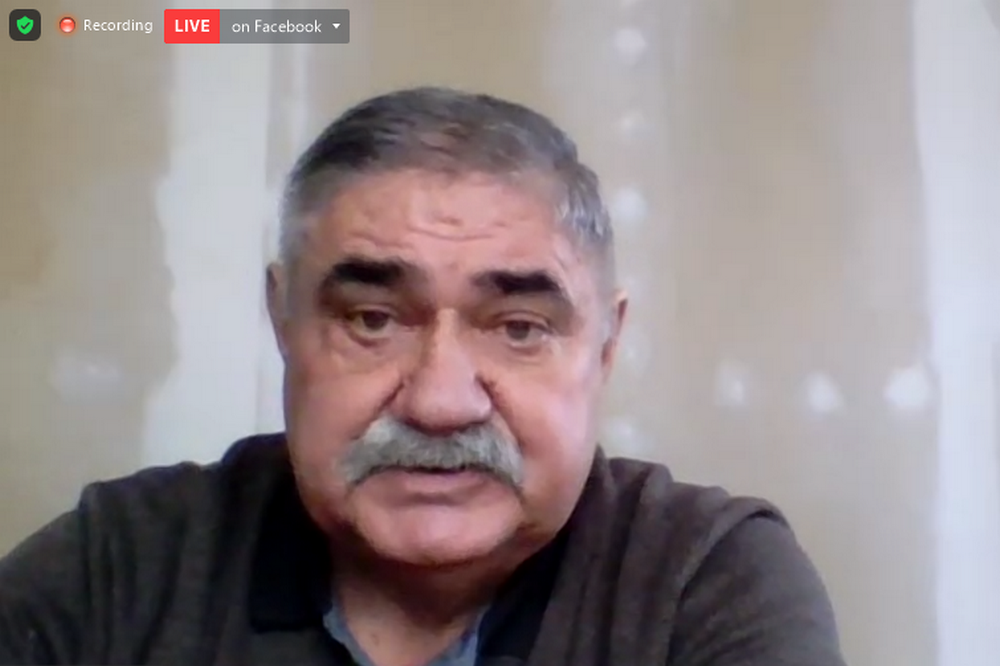
Anatolii Zhupyna, the editor-in-chief of the Kherson Novyi Den newspaper, agrees with his colleague from Izium. After the occupation of Kherson, the editorial staff had to leave the city, but with the help of Lviv colleagues, in particular, the Journalists’ Solidarity Center of the NUJU in Lviv, they continued to work, producing their website and filling pages in social networks.
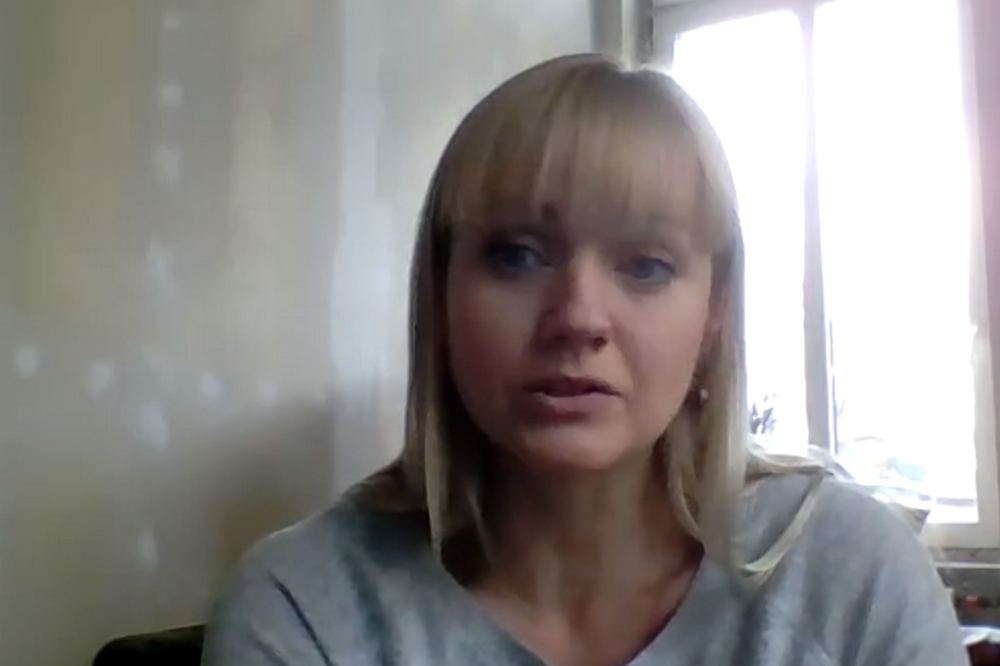
“For a long time in the Kherson Region, social networks remained the only source of true information,” Anatolii’s daughter and a deputy head of the Novyi Den’s editorial office Oksana Pavlenko continues adds to her father’s words. “And we accepted this challenge. And we came to the conclusion that electronic and print media complement each other. Electronic media is a source of the latest information, while a newspaper is a platform for stories, analytics, and useful advice. Newspapers have their advantages. For example, newspapers are not burdened with the peculiar requirements for tolerance that are characteristic of Facebook. Newspapers can be read regardless of electricity supply. And, finally, the publication of a newspaper has a symbolic meaning: it means victory, stability.
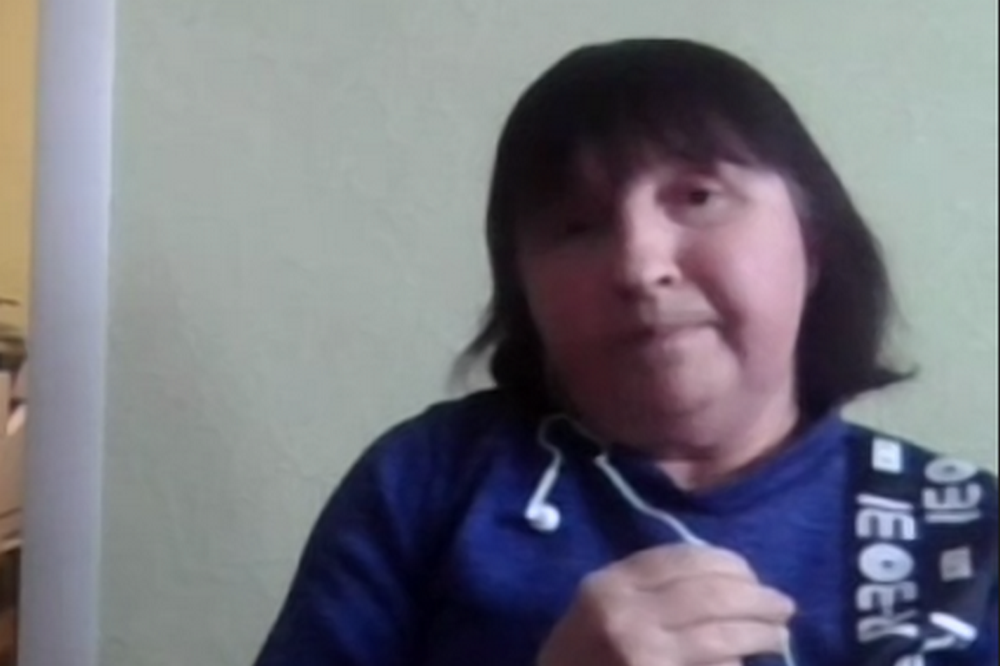
Iryna Stolbova, the editor-in-chief of the Visti Barvinkivshchyny newspaper (Kharkiv Region), also spoke about the importance of Facebook as an alternative platform for the dissemination of information in conditions where newspaper distribution is impossible.
“If we were forced to take a break in the publication of the newspaper, there were no breaks in the work of our Facebook page,” the editor emphasized. “We have restored our site, increased its audience to 30,000 views. Newspapers, websites, and social networks have their own audience. They have their pros and cons. Therefore, these types of media complement each other.”
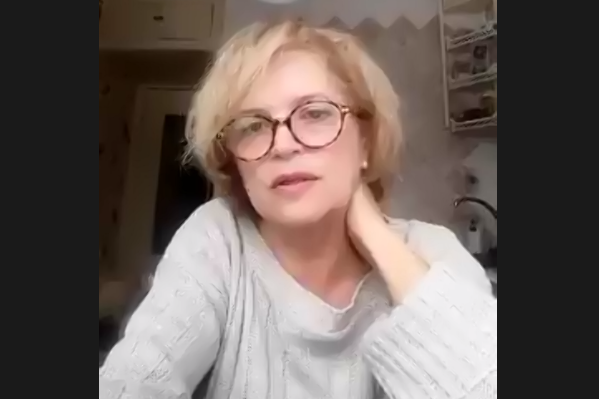
Svitlana Ovcharenko, the editor-in-chief of the Bakhmut newspaper Vpered, also spoke out for the combination of different types of media in the work of one editorial office.
“Websites and social networks are very necessary for Ukraine. But it is in Bakhmut that a newspaper is needed now,” the editor believes. “Today, there is enough food in Bakhmut, but there is a great lack of information. She is needed as a breath of air in Bakhmut’s basements and storage rooms, where there is no Internet, television, or radio.”
One of the most important topics of the revived Bakhmut newspaper Vpered is the necessity and safety of leaving this front-line city, which is under intense shelling.
“Many false rumors are spreading among people about the departure and treatment of Bakhmut residents in the safe territories of Ukraine,” emphasized editor Svitlana Ovcharenko. “I am very grateful to the NUJU for their help in resuming publication. The newspaper is not a website, one desire is not enough here, we also need paper, printing itself… Therefore, we cannot do without the support of colleagues and benefactors,” emphasized Svitlana Ovcharenko.
Vasyl Miroshnyk, the editor-in-chief of the newspaper Zoria from Zolochiv, Kharkiv Region, believes that the prospect of media development is a combination of online and print media. In addition to economic expediency, he emphasized another aspect: the moral responsibility of editorial offices to those readers who do not have access to the Internet.
On the other hand, Serhii Narodenko, the head of the Chernihiv newspaper Visnyk Ch with a circulation of almost 27,000 copies, believes that print and Internet media are completely different in terms of audience and form of presentation of media material, and therefore different journalist teams have to work on them.
“I am against the print media having its own website or social media account. These are completely different media. For a printed newspaper and an Internet site, separate editorial offices should be recruited,” the editor believes.
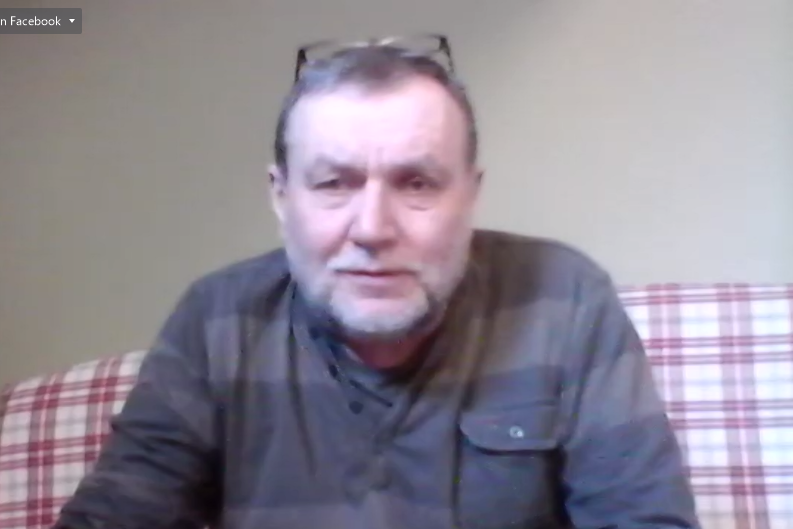
Serhiy Narodenko noted that after the start of the war and the occupation of a part of Chernihiv Region, Visnyk Ch lost 20% of its readers and now has to turn to financial donors for help. At the same time, he considers these difficulties to be temporary, because the editorial office, preparing for military challenges, stocked up in advance with generators, laptops, and even a spare location in case the ruining of the editorial office.
“We, in fact, depend only on the printing house and the post office. They print, distribute, and that means, the newspaper is published,” emphasizes Serhii Narodenko. “They say the printed press is dead, it is gone. And 19 people work in our newspaper! The printed press will not die until people lose the desire to read. And people will have this desire as long as journalists work responsibly.
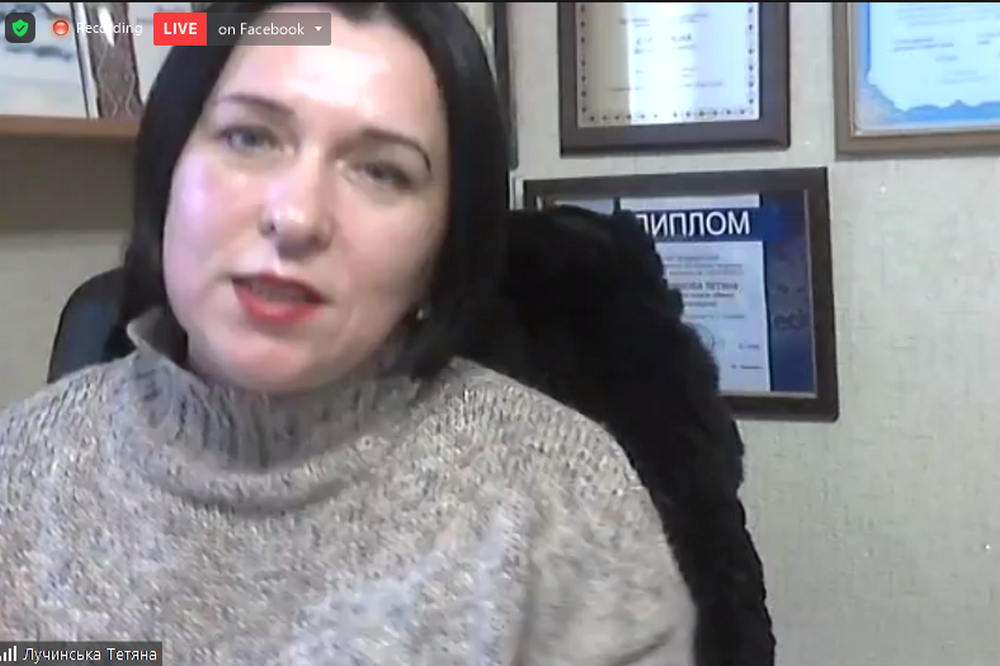
Tetiana Luchynska, the editor of the Mayak newspaper from Bohodukhiv, Kharkiv Region, also supports the idea of the separating print and Internet media from each other.
“We sometimes make announcements of our publications on TikTok. Then the readers began to say that the information in the announcements was quite enough for them, avoiding reading the article itself,” says the editor.
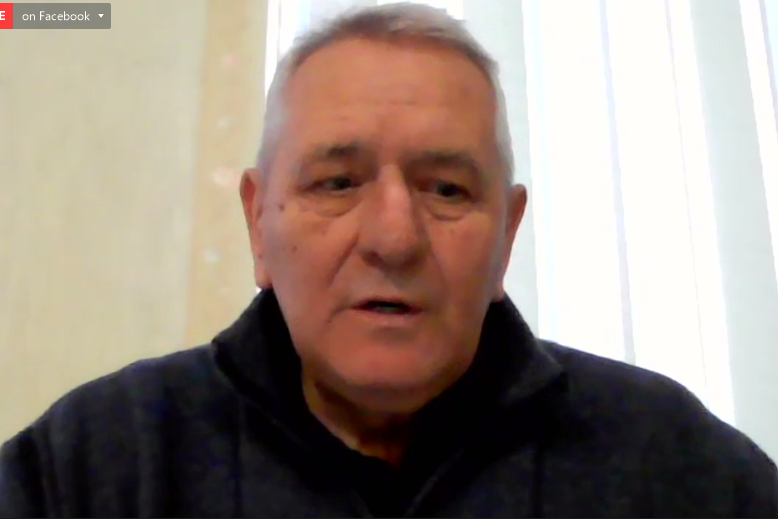
Oleksandr Pasichnyk, the editor-in-chief of the Zoria newspaper from Lyman, Kharkiv Region, believes that print media has a future.
“Nothing can replace the smell of a newspaper,” he notes figuratively. “This is evidenced by world experience. The New York Times and Washington Post are still in print, so we will be in print! Currently, we go to an audience of 12,000 in the Lyman community with a circulation of 3,000 copies, and people are asking for more.
Oleksandr Pasichnyk sees the economic basis for the development of newspapers not only in the support of foreign donors, but also in the preparation of image articles in cooperation with local businesses.
Another discussion during the meeting revolved around print media cooperation with Ukrposhta.
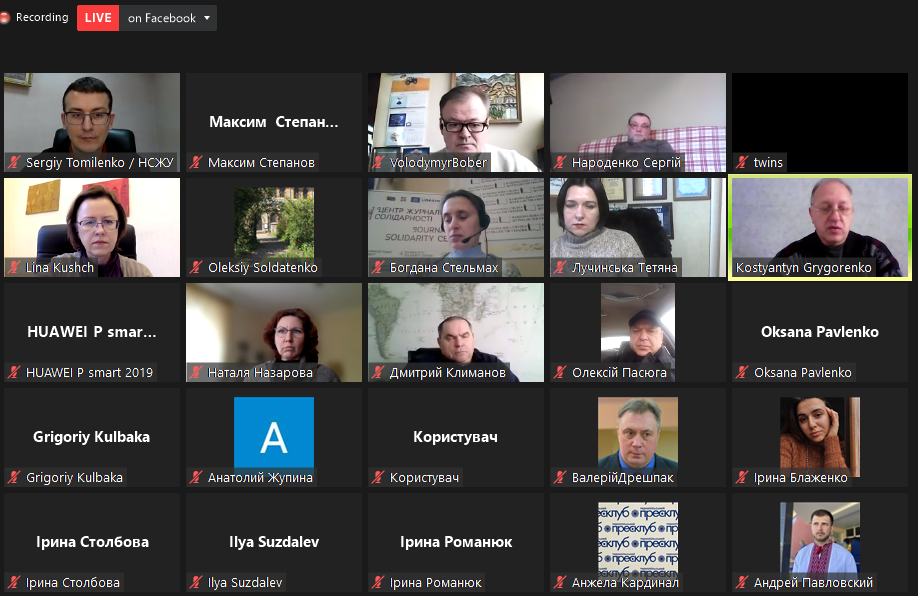
“Now the most complaints are about mobile post offices,” said Serhii Narodenko, the editor of Chernihiv Visnyk Ch. “But they first appeared in the Chernihiv Region. And we were able to build work with mail in such a way that both parties were satisfied. The basis of such cooperation is simple human communication,” the editor is convinced.
Vasyl Miroshnyk, the editor of the Zoria newspaper from Zolochiv, Kharkiv Region, holds a different opinion.
“Ukrposhta is a very bad partner, he believes. The postal service charges a lot of money for low-quality services. Therefore, I have the experience of distributing the newspaper on my own.”
Anatolii Zhupyna, the editor of the Kherson-based Novyi Den newspaper, added that cooperation with Ukrposhta is possible only where it works stably. For example, in the liberated part of the Kherson Region, it is more natural to distribute the newspaper for free with the help of volunteers.
All participants of the meeting emphasized that working with foreign financial donors can bring real benefits and help the media to survive. Some of them are ready to spend grant funds on staff salaries, some on the purchase of editorial equipment and design of holiday issues. However, everyone is convinced that the help of foreign colleagues is not only material help, but also a manifestation of moral solidarity of the journalistic community, which is very important in conditions of war.
“The most important thing is not to give up. Because help comes to those who, first of all, want to help themselves,” said Iryna Stolbova, the editor of Visti Barvinkivshchyny.
Speaking during the discussion, the coordinators of the Journalists’ Solidarity Centers, Nataliya Nazarova from Dnipro and Bohdana Stelmakh from Lviv, spoke about this.
“Your desire to survive inspires us too,” said Bohdana Stelmakh.
And Lina Kushch, the First Secretary of the NUJU, emphasized the attentiveness of international financial donors to those whom they help to.
“They look with interest at your publications, which are presented to them by the NUJU President. They are interested not only in the obstacles that exist in your work, but also in the observance of journalistic standards, ethics, and coverage of the problems of people who usually do not have a voice in the Ukrainian media (for example, residents of front-line, occupied territories). Working with financial donors is difficult, but also fruitful,” said Lina Kushch. “So don’t hesitate to knock on all the doors, submit applications. And the NUJU will support you in everything.”
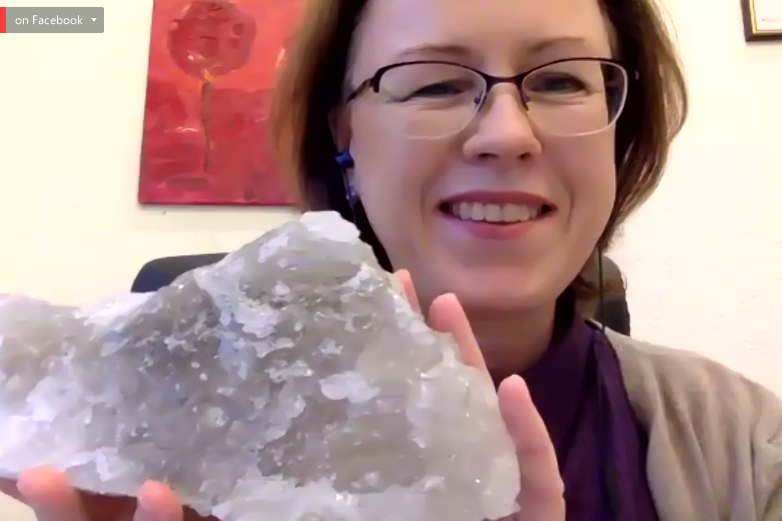
The online meeting was organized by the NUJU, Journalists’ Solidarity Centers with the support of the Swiss non-profit organization Fondation Hirondelle and the IRMI (Ukraine) as part of the project called Increasing Resilience of Ukrainian Media, financed by Swiss Solidarity.
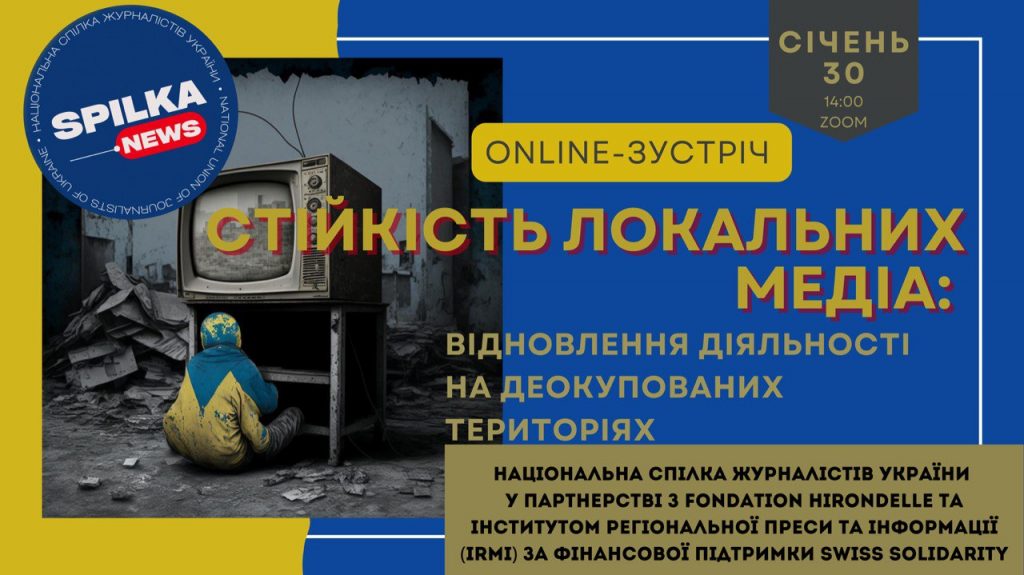
As earlier reported, Journalists’ Solidarity Centers are an initiative of the National Union of Journalists of Ukraine implemented with the support of the International and European Federations of Journalists, as well as UNESCO. The initiative is aimed at helping media representatives working in Ukraine during the war. The centers operate in Kyiv, Lviv, Ivano-Frankivsk, Chernivtsi, Zaporizhzhia, Dnipro and provide journalists with organizational, technical, legal, psychological, and other types of assistance.
NUJU information service





